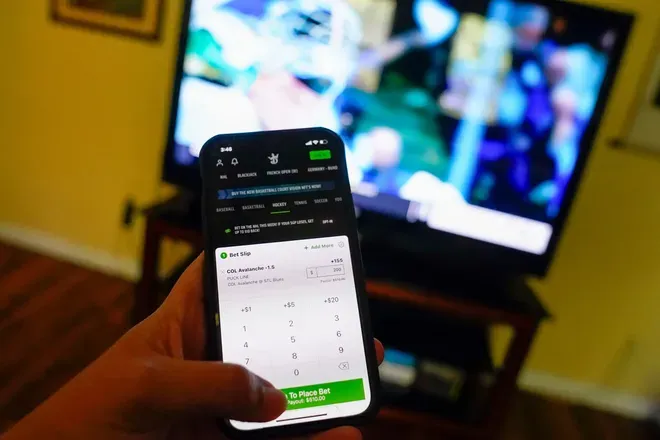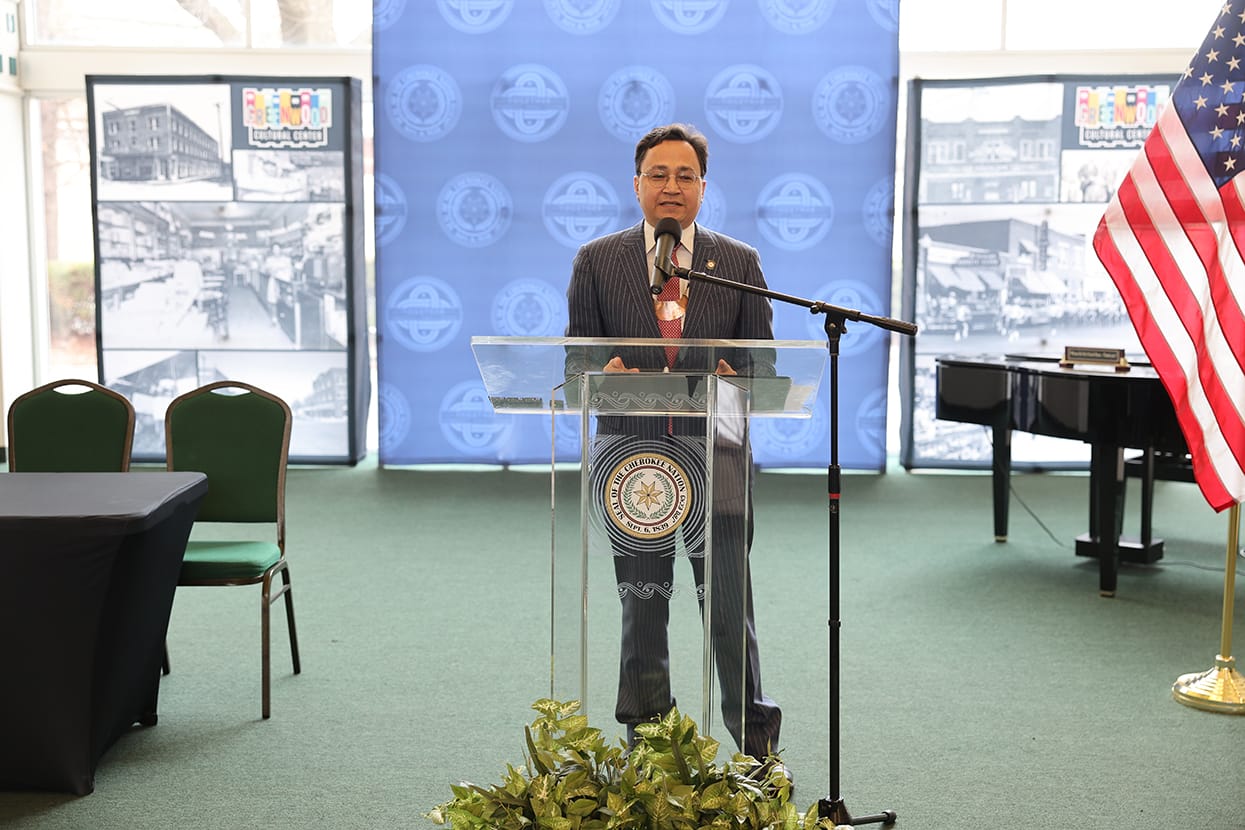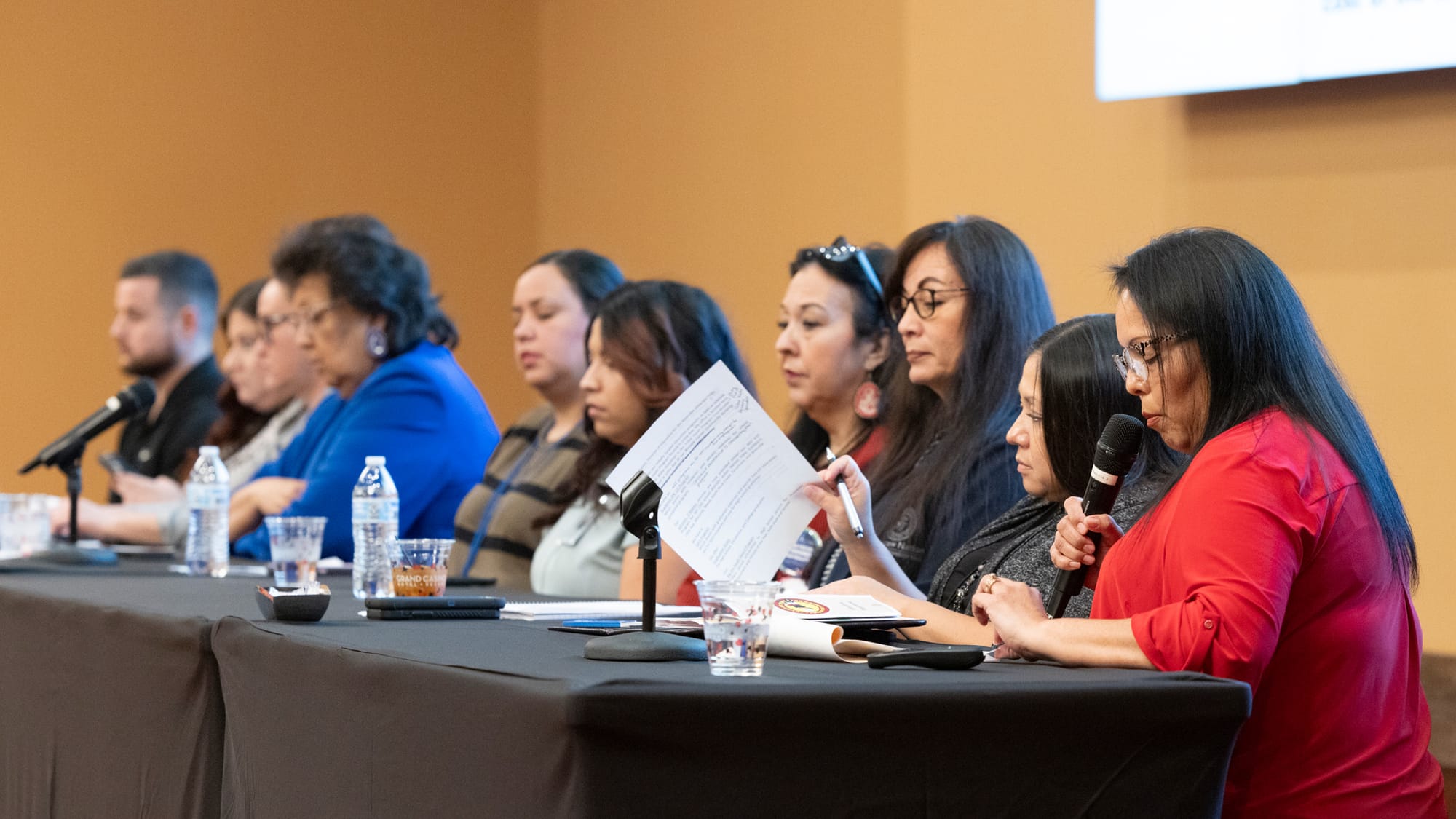

Sports betting still isn't legal in Oklahoma. Could that change this year?

by Molly Young, The Oklahoman
Some Oklahoma lawmakers want to bring the state off the sidelines of sports betting and into the game. They’re facing long odds, however.
Gov. Kevin Stitt wants to open Oklahoma’s betting market to outside competitors. Tribal officials say doing so would violate their gaming agreement with the state.
Without a consensus, efforts to legalize sports betting appear unlikely to gain traction during the legislative session this spring.
“I believe it’s still in the governor’s court and still in the tribes’ court,” said Sen. Bill Coleman, who supports legalization.
Sports betting is allowed in 38 states, including four that touch Oklahoma, and surging in popularity. Nearly 29 million U.S. adults planned to place a legal online bet on this year’s Super Bowl, according to industry estimates. The American Gaming Association also estimated a record $23.1 billion would be wagered on the game.
Still, a sports betting bill has never crossed the finish line in Oklahoma. The biggest sticking point has been how much money the state should receive for allowing the bets.
A voter-approved compact gives tribal nations exclusive rights to operate nearly all forms of gaming in the state. In exchange, Oklahoma receives a share of the money those operations bring in — about $200 million last year.
Talks of expanding the compact to cover sports betting have been caught in a long-running rift between Stitt and many tribal leaders. They’ll have to work out an agreement to move forward, said Coleman, a Ponca City Republican.
“Once we get past that, let me at the table, and let’s get going,” he said.
At the same time, tribal leaders are waiting for Stitt and lawmakers to come up with a serious proposal they can consider, said Matthew Morgan, who chairs the Oklahoma Indian Gaming Association. The group represents 29 of the 33 Oklahoma tribal nations that conduct gaming.
“They do not want to negotiate multiple times, with individual lawmakers, individual chambers, the governor,” Morgan said. “We really need them to be on the same team on this, as well. I think that’s how this moves forward in a way that’s efficient.”
Two sports betting bills up for consideration in the Oklahoma Legislature
Two competing sports betting bills are currently up for consideration, though neither has moved forward in the early weeks of the session.
The first is House Bill 1027, backed by Coleman and Rep. Ken Luttrell, a fellow Ponca City GOP lawmaker. Both have described the measure, which seeks to add sports betting on to the state-tribal gaming compact, as a work in progress.
“We would be willing to change the bill to reach any agreement that is being made,” Coleman said.
The bill passed through the House last year with the understanding that it eventually would be updated to reflect agreed-upon terms, but it stalled in the Senate absent a deal. It would need to advance through the Senate Rules committee to move forward, Coleman said.
The second proposal is Senate Bill 1434, introduced by Sen. Casey Murdock, a Republican lawmaker from Felt in southwest Oklahoma. His bill largely mirrors the plan unveiled by Stitt in November.
The governor proposed allowing tribal casinos to take sports bets in person and allowing different operators to accept online game wagers. Tribal operations would pay 15% of revenues to the state, while online companies would pay 20%.
“I promised Oklahomans if we pursued sports betting, we would do it right, and this plan does just that,” Stitt said when he announced the proposal.
Would Oklahoma tribal nations be on board with proposed sports betting bills?
Murdock did not respond to a message to discuss the bill.
Coleman said he couldn’t see the proposal drawing any support from tribal nations, because most sports bets are placed online, not in person. He also said the tax rates proposed by Stitt likely wouldn’t pencil out for many tribal nations, because sportsbooks are expensive to set up and run on thin profit margins.
Bringing in outside competitors would violate the state-tribal gaming compact, Morgan said.
If that happened, tribal nations would file breach of compact claims, he said, which could leave Oklahoma liable for monetary damages under the terms of the compact. Tribes could also stop making exclusivity payments to the state, which add up to millions of dollars every month.
“If we’re going to continue to debate on who the operators are, I don’t think they’re serious,” about working out a sports betting agreement, Morgan said.
The topic hasn’t emerged as a top priority for House and Senate leaders in the midst of bigger debates over tax cuts. Neither Senate President Pro Tem Greg Treat nor House Speaker Charles McCall responded to questions left with their spokesmen about efforts to legalize sports betting this year.
Coleman said he believes he’s worked out a way to pass sports betting through the Senate, although his plan would have to overcome some hurdles.
“We want one item from the tribes that we don’t have right now, and the Senate would move forward with sports betting,” Coleman said, declining to name any specifics. “But it’s all kind of moot right now if the governor and tribes don’t have an agreement.”
He said he’s shared an updated draft bill with the governor’s office that incorporates some of Stitt’s ideas, such as prohibiting betting on the performance of individual athletes.
The growth of sports betting in other states, including neighboring Kansas and Arkansas, is increasing the pressure on Oklahoma to eventually act, he said. Support for gambling is also building in Texas.
“If we don’t have sports betting before Texas does, that would be a major loss in revenue,” Coleman said.
Molly Young covers Indigenous affairs. Reach her at mollyyoung@gannett.com or 405-347-3534.

Principal Chief Chuck Hoskin Jr. announces the tribe is seeking changes to the federal Major Crimes Act.

TULSA, Okla. — Cherokee Nation Principal Chief Chuck Hoskin Jr. announced the tribe is seeking changes to the federal Major Crimes Act, affording Cherokee citizens of Freedmen descent equal rights in the federal justice system.
The Major Crimes Act is the federal law that governs criminal jurisdiction of tribal citizens on tribal reservations. But the law, passed in 1885, has been interpreted by federal courts to require tribal citizens to have “Indian blood” discriminating against Cherokee citizens of Freedmen descent who may be tried in state court with other non-tribal members.
“By our Cherokee Nation Constitution and our tribal statutes, all Cherokee citizens are treated equally under our laws including criminal laws, irrespective of their descendancy, but this federal law is preventing our Freedmen citizens from equal treatment in the federal courts when it comes to their legal cases and this simply is not fair,” Chief Hoskin said. “We are asking for this change through an act of Congress or through the courts so our citizens can truly be treated equal.”
Chief Hoskin and Deputy Principal Chief Bryan Warner announced the move at an event at the Greenwood Cultural Center in Tulsa.
The Cherokee Nation currently has more than 15,000 citizens of Freedmen descent enrolled. The tribe’s 1866 Treaty with the U.S. government granted Freedmen “all the rights of native Cherokees.” And a 2017 federal court ruling, and Cherokee Nation Supreme Court ruling affirmed that Freedmen descendants are full Cherokee citizens under the law.
“We’ve upheld our ancestors wishes ensuring Cherokee citizens of Freedmen descent have equal protections in voting, running for office, services and in our Constitution and this specific federal law should not limit that equality,” Deputy Chief Bryan Warner said. “For Cherokee Nation, this exercise of tribal sovereignty means we count as tribal citizens all of those who descend from the Cherokee portion of the Dawes rolls in a variety of ways, including Freedmen descendants.”
Chief Hoskin and Deputy Chief Warner reached out to the Five Tribes leaders to notify them of the tribe’s intent and have begun reaching out to members of Congress and federal officials.
“The change we seek is narrowly tailored to ensure equality for Cherokee citizens of Freedmen descent on the basis that they are equal citizens within the Cherokee Nation,” Chief Hoskin said.
The citizenship rights of individuals of freedmen descent connected to other tribal nations has not yet been fully resolved.
“We know there are some tribal citizens out there who may be prosecuted in state court after the U.S. Supreme Court McGirt decision, because of the Major Crimes Act,” Cherokee Nation Attorney General Chad Harsha said. “We are taking an inventory of these cases as we lobby to change this law and ensure all Cherokee citizens are treated equally as a matter of equality in the federal justice system.”
Chief Hoskin said the tribe will either find a suitable criminal case in which a Cherokee citizen of Freedmen descent is subjected to state prosecution and advocate, within that case, that the defendant be treated as a citizen of the Cherokee Nation and not subject to state jurisdiction while also exploring a federal legislative change that could, as an alternative, achieve that outcome for Cherokee citizens of freedman descent.
“In both instances the necessity under federal law of a “blood quantum” must be resolved in favor of including, rather than excluding, Cherokee Nation citizens of Freedmen descent under the Major Crimes Act,” Chief Hoskin added.
CPN hosts Tribal Education Forum

By: Tina Bridenstine, Citizen Potawatomi Nation Public Information Department
Citizen Potawatomi Nation hosted the Tribal Education Departments’ Forum (TED Forum) at the Grand Casino Hotel & Resort in November.
Representatives from a variety of tribes and organizations presented information to educators from around the state, offering insight into what sort of services and opportunities are available for schools and Indigenous youth.
“The purpose is to gather as many TEDS (Tribal Education Departments) as possible in one place and have them speak directly to the counselors and educators,” Charles Lee, assistant director of the CPN Department of Education, said. “This way there is no confusion about what services each nation provides to their citizens, and it will remove any obstacles for students to receive services.”
Lee added the event also gives the tribal education departments a chance to speak to each other and form relationships that could lead to future collaborations.
More than 70 representatives attended the forum, coming from 46 school districts and 25 different counties across the state of Oklahoma.
Among those presenting were representatives from Citizen Potawatomi Nation, Absentee Shawnee Tribe, Choctaw Nation, Comanche Nation, Iowa Tribe of Oklahoma, The Muscogee Nation, Osage Nation, Sac & Fox Nation, Quapaw Tribe, American Indian Science and Engineering Society (AISES) and the U.S. Bureau of Indian Affairs.
Representatives discussed what programs and assistance are available from the various tribes, many of which included scholarships, advising, internships, ACT workshops, college fairs, graduation stoles and assistance paying for youth programming such as camps and extracurricular activities.
Among the services offered by CPN were scholarships, advising, internships, ACT workshops, an annual college fair during the first week of September, graduation celebration, lesson plans for social studies and government teachers, the Johnson O’Malley Program, youth programming that pays for things like camps that develop leadership, the Potawatomi Leadership Program for 18 to 20-year-old students, and a new program called Coming into the Circle.
AISES presented about the National American Indian Science and Engineering Fair (NAISEF) at Oklahoma State University. The fair is for students in 5th through 12th grades, and students can participate individually or in teams of up to three.
The representative from the U.S. Bureau of Indian Affairs discussed BIA Pathways Internship Program, a federally-funded program that helps students find paid internships as well as careers after graduation.
The TED Forum is in its third year, with the CPN Department of Education planning to host it annually.
For more information about the CPN Department of Education, visit cpn.news/education.
Rockee Harjo Leads Hollywood Producers as an Oklahoma Native Location Scout
by Ryann Gordon
Native narratives, producers and entire film teams have become sought after in mainstream film, after cinematic successes like Reservation Dogs and Killers of the Flower Moon were popularized, both of which were filmed in our very own state. One of the key players in local film production is Rockee Harjo, a Creek and Seminole film savant in Tulsa who just got off the set of Twisters, the sequel to Twister, both filmed in Oklahoma. Brother of legendary director, Sterlin Harjo, who gained Hollywood fame from Rez Dogs, Rockee Harjo began his journey in film in high school.
“My brother is in the film industry, he kind of shaped Oklahoma film independent film anyways,” says Rockee Harjo. “He did a lot of short films in high school. I would occasionally be an un-paid Production Assistant or if he needed a boom operator, I’d do that.”
From Holdenville, OK, Rockee quickly became a coveted Location Scout, working on all three seasons of Rez Dogs and other motion pictures in the works soon after. He credits the small-town upbringing to his interest in creativity.
“We just had a VCR, we didn’t have satellite or cable,” he says. “We lived out in the country, so we spent a lot of our time fishing or hunting or watching movies. Boredom really led to a creative outlet. We all became artists. My dad is a really great artist. That’s what we did when we were bored. Like my dad, any medium he touches he’d be really good at. The creativity spawned out of boredom.”
Now a sought-after Location Scout, Rockee explains the role as a “middleman” of sorts. They are responsible for finding and organizing shooting locations that portray the setting, giving them special demand in Oklahoma, where the diverse communal and geographical landscapes would be unfit for an outsider to illustrate.
“I aim for accuracy when it comes to location,” he says. “I mostly have worked on indigenous stuff, so they wanted reservation looks and I’m able to give them tribal houses and Native community standards. I’m kind of the middleman. We make sure the crew takes care of the places we film at. We deal with real world along with the production. We wear a lot of hats. We’re kind of a catch-all, if it’s not camera or sound, or actors, we deal with everything else. In Oklahoma, we don’t have many sound stages, so everything is filmed on location. So we are pretty busy. We’re responsible for the way most films look and the general vibe of the setting.”
When Hollywood producers come to Oklahoma to shoot films, they want a Location Scout who is a local, who knows the area, knows the people, the talk, the cool or pretty spots that typify the region, someone who can paint an accurate, overall picture of the location.
“I’m lucky because I’ve lived and I’ve learned in Oklahoma,” says Rockee. “What I’ve learned in the film industry is LA, New York, Atlanta, they do it different than us, different than the Oklahoma film crew. It’s not as familial. That’s why Rez Dogs was so special, because it was a shitload of Oklahomans, and we care. We’re family. We built this up together. It’s a different community we’ve fostered here than I’ve noticed with out-of-state production companies. That leads to more respect and more caring with each other.”
Rockee gives respect to his and others’ Native heritage when addressing the ethics that go into Oklahoma film.
“There’s something on Reservation Dogs like over 35 or 40 tribes represented between the cast and crew,” he says. “I couldn’t even name every tribe that was there. Multiple, multiple indigenous people worked on that. I can’t think of any department without an indigenous person. And like the biggest show with indigenous department leaders. Sound department had one of my really good friends, Royce Sharp, he’s an Osage member, and one of the first Native American department heads in sound was Royce.”
Reflecting on one of the most celebrated episodes in a series to date, the “Deer Lady” episode of Rez Dogs, Rockee describes the levels of work, history and accuracy that went into just one episode of a Native Oklahoma series.
“Some of my oldest memories are like, ‘You better be good, or Deer Lady is gonna come get you,’” he says. “I remember being a kid, every one of our uncles would have a story where they met Deer Lady, someone knocking on their door and it’s this lady who said her car broke down and they look down and she had hooves. Anytime I was at grandma’s house I was like, ‘Yeah I’m not going outside because you said Deer Lady would come get me.’ I’m glad we navigated it into a vigilante roll instead of just a villain, something to be scared of. Just like, be a good dude. And that episode is phenomenal.”
One of the things that makes these types of cinemas great is the accuracy of the details. Behind the scenes, people like Rockee and others work to curate these fixing moments that connect the audience to the scene at hand.
“Season three we had a language coach, our good friend Warren, was there to make sure the language they were speaking is accurate,” he says. “We had a bunch of kids who were indigenous and all different languages. And the “Deer Lady” episode they were making sure the language was accurate and their cadence was right. He [Warren] was right next to the cameras and anytime any one of the kids second guessed themselves, they looked straight to him. It was powerful.
“It’s just like, visualizing this story we’d all been told, seen our whole life was, from being forced to not speak our language, getting in trouble for speaking your language, and like, erasing your culture through this lens of someone else saying what’s best for you. Everyone there was crying. Seeing these kids, sweet as they were, having the time of their lives but seeing them in these clothes and put in the back of this truck, it was heartbreaking and cathartic at the same time. There wasn’t a dry eye during that whole episode.”



